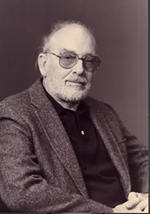David Cass
| David Cass | |
|---|---|
 |
|
| Born |
January 19, 1937 Honolulu, Hawaii, USA |
| Died | April 15, 2008 (aged 71) Philadelphia, Pennsylvania, USA |
| Nationality | American |
| Fields | Economics |
| Institutions |
University of Pennsylvania Carnegie-Mellon University Yale University |
| Alma mater |
Stanford University (Ph.D.) University of Oregon (A.B.) |
| Doctoral advisor | Hirofumi Uzawa |
| Doctoral students | Finn E. Kydland |
| Known for | General equilibrium theory |
David Cass (January 19, 1937 – April 15, 2008) was a professor of economics at the University of Pennsylvania, mostly known for his contributions to general equilibrium theory. His most famous work was on the Ramsey–Cass–Koopmans model of economic growth.
David Cass was born in 1937 in Honolulu, Hawaii. He earned an A.B. in economics from the University of Oregon in 1958 and started to study law at the Harvard Law School as he thought of becoming a lawyer according to family tradition. As he hated studying law he left the program after one year and served in the army from 1959 to 1960. He then entered the economics Ph.D. program at Stanford University. Here he met Karl Shell, although the two began to work together only after both graduated. Cass' doctoral advisor was Hirofumi Uzawa, who also introduced him to Tjalling Koopmans, who at that time was a professor at Yale University. In 1965, Cass graduated with a Ph.D. in economics and statistics with a dissertation on optimal growth, with parts of the dissertation later published in the Review of Economic Studies.
After graduation Cass began to work from 1965 to 1970 as an assistant professor at the economics department of Yale University and as a research associate at the Cowles Commission for Research in Economics in New Haven. During his time at Yale University he collaborated with Menahem Yaari[] and Joseph Stiglitz and worked mostly on overlapping generations models. In 1970 he left New Haven for Carnegie-Mellon University in Pittsburgh, where he was a professor of economics until 1974. During his time at Carnegie-Mellon he began to collaborate with Karl Shell, who at this time was a professor at the University of Pennsylvania. One of his doctoral students was Finn E. Kydland, who would later win the Nobel Prize in Economics. In 1974 Cass left for the University of Pennsylvania, where he was a professor of economics until his death. David Cass died in 2008 in Philadelphia after a long illness. He was divorced and the father of two children.
...
Wikipedia
